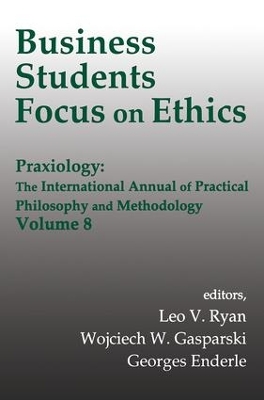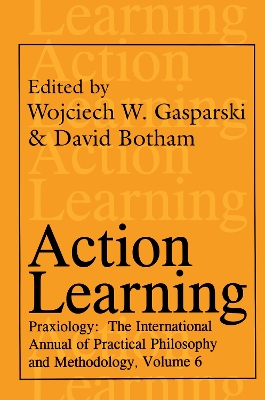Praxiology
6 total works
Praxiology deals with doing and working from the point of view of effectiveness. It has three components: analysis of concepts involving purposive actions; critique of models of action from the viewpoint of efficiency; and normative advisory aspects in recommendations for increasing human efficiency. This fourth volume of the Praxiology series is devoted to the very special topic of social agency. It focuses on two important praxiological concepts: rationality and preparation as preconditions for human action to be effective and efficient.
The question of efficiency was raised by Anatol Rapoport over three decades ago in his lecture to the audience at the Praxiological Seminar in Warsaw in 1961. Social Agency begins with an article written by this same famous scholar on the topic of decision theory, "Social Dilemmas: A Historical Overview." Social dilemmas is the subject of the first part of this volume, a question related to studies on human action guided by two types of rationality: individual and collective rationality. The intersection of the two, in which individuals meet collectives, creates the situation in which social agency emerges, generating dilemmatic circumstances for the actors involved.
The articles collected in the second part explore praxiological dimensions of education aimed toward the knowledge society, because of knowledge possessed and produced by educated persons. Chapters and contributors to volume 4 include: "Five Questions on the Research on Social Dilemmas" by Marek K. Mlicki; "Psychological Processes Underlying Cooperation in Social Dilemmas" by Paul A. M. Van Lange and David M. Messick; "Designing a System for Design Learning: Designers and/or Learners?" by Arne Collen; "Creating an Evolutionary Image of New Systems of Learning and Human Development" by Janet A. Khan; and "A Study Program Design in Retrospect" by Stig C. Holmberg. Social Agency continues the trend of original research done in a little-known, but important area. Social scientists, policymakers, and educators will benefit from this work.
This latest volume in this important international series discusses practical errors and wrongdoing considered under the action theory (praxiological) umbrella, linking these to ethical behavior. Human actions related to the conduct of business should be effective and efficient. But such praxiological criteria are of secondary importance to norms that should also be taken into account. The primary norm is ethical behavior, which defines the morality of business activities on the basis of the good; these are the presupposed foundations for the human actions in business.
The articles in this volume discuss whistleblowing, or the exposure of behavior that violates the ethical foundations of business. They are written from different angles and present a variety of experiences, adding new value to both the subject of praxiology as well as ethics as it relates to economic activity in its social and global context. The issues, problems, and questions raised by this international group of eminent scholars have much to add to the contemporary debate induced by the present economic crises. These crises have revealed practical errors and hypocrisy of those responsible for leadership and management, primarily of financial institutions.
The need for solutions to environmental problems is urgent. Expanded environmental research and knowledge, along with interest in environmental issues, has focused attention on the social, political, and practical aspects of environmental problems. Environmental Political Philosophy searches for common environmental goals, values, and policies in society.
An essential undercurrent in political theory about the environment is that such issues are not questions of efficiency or technology. They cannot simply be addressed through knowledge of processes and mechanics of nature, by boosting or targeting research, or by allocating of resources and development of technology. Neither can they be resolved solely by increasing civic understanding and mounting environmental campaigns or requiring endless eco-friendly actions.
A crucial element of environmental political philosophy is highlighted through the studies in this volume, which address the question of what constitutes efficient action or effective decision making. Praxiology commences with empirical orientation, but does so by maintaining the important sense that in the evaluation of actions and policies, ethical considerations must be employed in conjunction with effectiveness and efficiency.
With the collapse of communism and the accelerated trend of globalization, a new stage of capitalism has arrived. Protest actions that occurred in Seattle and Washington as well as in Prague and Genoa, clearly show that the legitimacy of capitalism is being questioned in many respects. Surveys in Eastern and Central Europe show that a considerable part of the population is not able to accept capitalism as an economic system. This volume assesses the ethical basis of capitalism in an effort to assess its future in the twenty-first century.Contributors range from one of the world's most successful capitalists and philanthropists to the founder of INSEAD, Europe's leading business school, to noted economists, philosophers, cultural historians, and business ethicists.
Praxiology is the study of working and doing from the point of view of effectiveness. It has three components: analysis of concepts involving purposive actions; critique of modes of action from the viewpoint of efficiency; and normative advisory aspects in recommen-dations for increasing human efficacy. This sixth volume of the Praxiology series fo-cuses on action learning. Learning from distinguishable action is surprisingly different than learning from a sub-ject expert in human or book form. For those who have worked with and in action learn-ing, the latest form is always distinguishably different from a former experience. Action learning programs are not, in general, intended to tackle puzzles, namely, questions to which an answer may be said to exist even if that answer is difficult to find; action learn-ing is intended to help to develop the ability to tackle problems or opportunities, of which different persons, all experienced, intelligent, and motivated, might well advocate differ-ent courses of action, all reasonable. The essentials of action learning, according to this volume, are: there can be no learning unless the participant receives feedback about his/her performance; partici-pants learn only of their own volition and never at the will of others; the volition to learn is most readily engendered by the lure of success or by the fear of calamity. Building upon these essentials, the authors view action learning as a process of inquiry begin-ning with the experience of not knowing what to do next, and finding that an answer is not available from current expertise. All chapters in this volume are sound contributions to the continuing debate on the processes of learning from distinguishable action. Action Learning is intriguing reading for sociologists, philosophers, managers, and research-ers of all disciplines.





